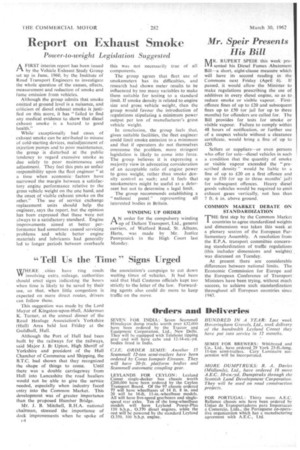Report on Exhaust Smoke
Page 44

If you've noticed an error in this article please click here to report it so we can fix it.
Power-to-weight Legislation Suggested
AFIRST interim report has been issued by the Vehicle Exhaust Study Group set up in June. 1960. by the Institute of Road Transport Engineers to investigate the whole question of the causes, effects, measurement and reduction of smoke and fume emission from vehicles.
Although the group admits that smoke emitted at ground level is a nuisance, and criticism of diesel exhaust smoke is justified on this score, it has "failed to find any medical evidence to show that diesel exhaust smoke is a hazard to good health."
While exceptionalls: bad cases of exhaust smoke can be attributed to misuse of cold-starting devices, maladjustment of injection pumps and to poor maintenance, the group is disturbed at the public tendency to regard excessive smoke as due solely to poor maintenance and adjustment. They feel this puts an unfair responsibility upon the fleet engineer " at a time when economic • factors have narrowed the margin between a satisfactory engine performance relative to the gross vehicle weight on the one hand, and the onset of visible exhaust smoke on the other." The use of service exchange replacement units should help the engineer, says the report, but the opinion has been expressed that these were not always to a satisfactory standard. Engine improvements aimed at better performance had sometimes caused servicing problems and while better engine materials and lubricants had generally led to longer periods between overhauls this was not necessarily true of all components.
The group agrees that fleet use of smokerneters has its difficulties, and research had shown meter results to be influenced by too many variables to make them suitable for testing to a standard limit. If smoke density is related to engine size and gross vehicle weight. then the group would favour the introduction of regulations stipulating a minimum power output per ton of manufacturer's gross vehicle weight.
In conclusion, the group feels that, given suitable facilities, the fleet engineer could limit smoke emission to a minimum and that if operators do not themselves overcome the problem, more stringent legislation is likely to come into force. The group believes it is expressing a majority view in advocating consideration of an acceptable ratio of engine power to gross weight, rather than smoke density control as such; and it feels that smokemeters might be useful as a deterrent but not to determine a legal limit.
The group recommends establishing a " national panel representing all interested bodies in Britain.
WINDING UP ORDER A N order for the compulsory winding rAup of Defiant Transport, Ltd., general carriers, of Watford Road, St. Albans, Herts, was made by Mr. Justice Pennycuick in the High Court last Monday.
































































































































